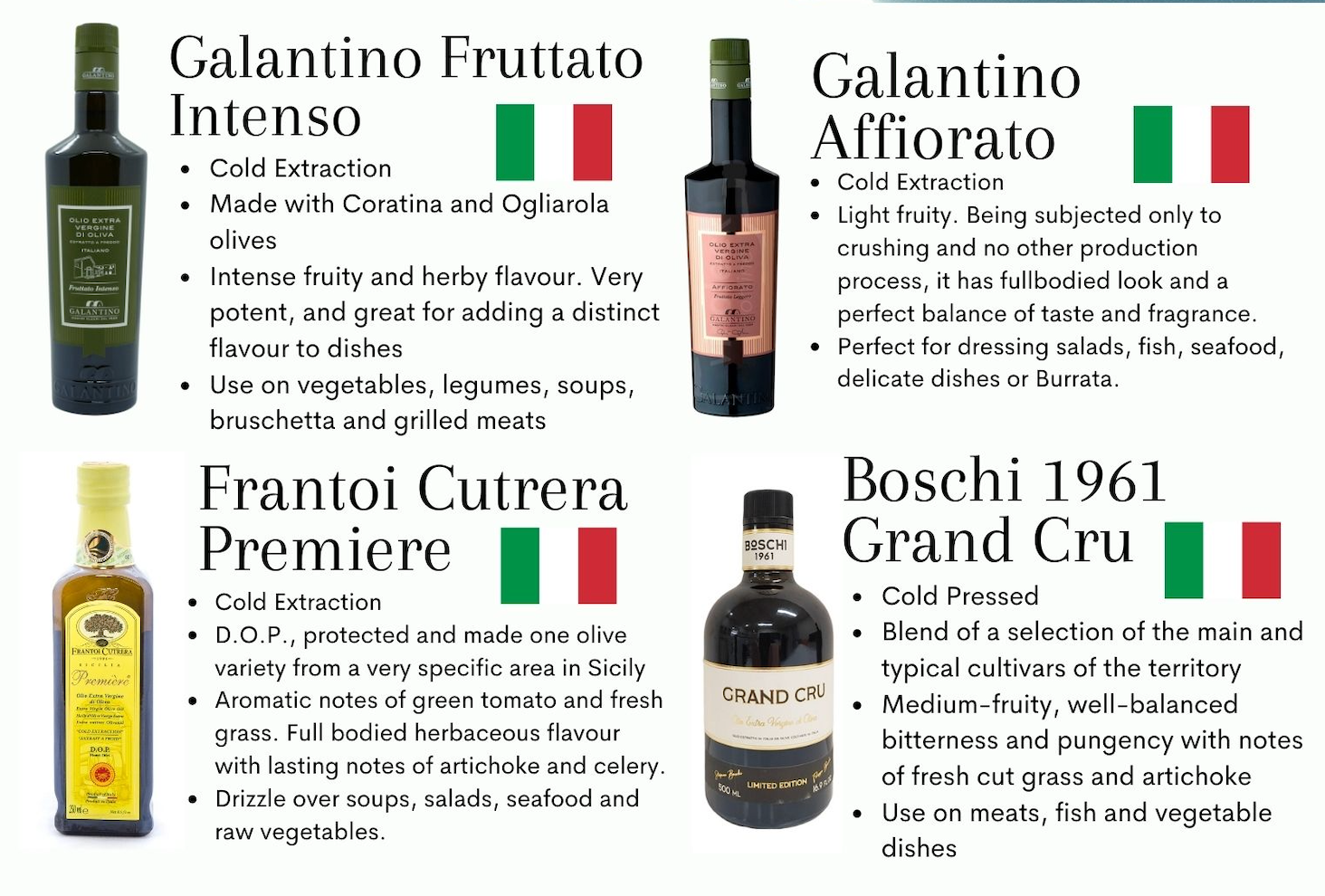
What is Olive Oil?
So what is olive oil? Olive oil is a type of vegetable oil made from olives that is extracted by either crushing or pressing the olives. Olive oil can be used in cooking, baking, or as a finishing oil for dressing salads or other foods. There are various types of olive oils, with a grading systems based on how the olives were extracted and what kind of olives were used.
Often what is labeled as "olive oil" in stores is actually a grade referred to as refined olive oil. This is virgin olive oil that has been further processed, with some more pure virgin potentially added for taste.
What is Extra Virgin Olive Oil (EVOO)?
Extra Virgin olive oil is a grade of "virgin" olive oil. Virgin, in this case, refers to how the oil was extracted only by mechanical means, either through a traditional pressing method or with a centrifugation. Real Extra Virgin Olive Oil is the highest quality and most flavourful oil that you can buy. It is achieved through pressing olives with a stone mill, a process that has been happening since ancient times.
The biggest difference between extra virgin olive oil compared to regular olive oil comes down to the process. EVOO is made only from the purest processes, making it more difficult and time-consuming to make. EVOO is specifically made without heat, called cold-pressing, which protects the natural flavour of the oil. The refining process (where the oil is heated) in cheaper olive oils strips the oil of its natural nutrients and vitamins.
EVOO is usually darker and more green in colour compared to olive oil, due to the pure extraction of the olive. It is also typically more expensive due to the labour required. To get the label of "extra virgin," the oil EVOO must be free from defects like abnormal acidity, bitterness, or pungency.

When to use Olive Oil vs Extra Virgin Olive Oil?
When choosing which oil is best for your dish, you should consider what type of cooking method you will be using and how much flavour you want from your oil. Regular olive oils tend to be bland in taste, but have a higher smoke point than EVOO. This makes is the better option for frying or searing proteins, so reach for this if you are looking for a mild oil to cook with.
Extra virgin olive oils tend to have a more distinct flavour and aroma, due to its delicate chemical structure. This breaks down when it is heated too high, impacting the oils flavour. Therefore, this should be avoided for high-heat cooking. Instead, use EVOO for dressing salads, as a dip, or as a finishing oil for pasta dishes or grilled proteins. It especially shines through in simple Mediterranean dishes!
What is the difference between Italian, Spanish and Greek Olive Oils?
We carry a variety of olive oils from Italy, Spain and Greece, and we often get asked what the main difference between them are. The main difference comes down the variety of olive that is used, as different types are native to certain locations. The general rule of thumb for differences comes down to tasting notes. Spanish olive oils tend to be more "fruity", Italian more "grassy" or "herby," and Greek more "peppery". However, these notes can be found in oils from each country, depending on the type of olive used, the climate and the extraction method.
What is special about the oils we carry?
We only carry extra virgin olive oil in our store, which are mostly sourced directly from Europe. If you buy from us, you can be assured on the quality of the oil! We also carry a variety of different types of oils, from specialty flavours like truffle, roasted garlic, chilli or lemon, to various seed oils.
All-Rounder Olive Oils
We call these our "workhorse" extra virgin olive oils. These are the oils that you can reach for anything, whether is be cooking, finishing or dipping. These are a real staple in the kitchen, often having a smooth, almost buttery flavour that makes it incredibly versatile.
Use them for low heat cooking, in recipes like risotto or aglio e olio. Try added into salad dressing, dressing bruschetta or carpaccio, or drizzled over cheese, like burrata. Or just enjoy for dipping with some crusty bread!

Finishing Extra Virgin Olive Oils
These oils are best used raw in dishes as a finishing oil before serving. They tend to have a bit more flavour to them, with a stronger pepperiness, grassy or herby notes, or even a very slight spice to them. They really hold their own in a dish, making them the ideal choice for when you really want to taste that true EVOO flavour.
Try drizzled onto salads, fresh cheeses, grilled fish or meats, or even just on its own with a piece of bread. Due to their intense flavour, these oils are best enjoyed in simple preparations, where their unique notes can really shine.



